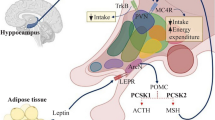Abstract
Obesity is a worldwide epidemic with rates nearly doubling over the last 30 years. Despite increasing prevalence, the multifactorial pathogenesis of obesity continues to be widely misunderstood. Investigating genetic drivers in the development of obesity is an important area of focus, as genetics move to the forefront of medicine and personalized treatment evolves. Thus, this narrative review focused on four genes which have genome-wide association study–documented links to obesity and obesity syndromes. We explored their involvement in the predisposition, progression, and prognosis of obesity. Leptin, leptin receptor, pro-opiomelanocortin, and melanocortin 4 receptor are our four genes of interest, and herein we elaborated on the current literature, pathogenesis, and available treatments for patients with these specific genetic mutations.
Similar content being viewed by others
References
World Health Organization (2018) Obesity and overweight. In: https://www.who.int/en/news-room/fact-sheets/detail/obesity-and-overweight Accessed on June 5th, 2017.
Berezina A, Belyaeva O, Berkovich O, et al. Prevalence, risk factors, and genetic traits in metabolically healthy and unhealthy obese individuals. Biomed Res Int. 2015;2015:548734.
Kent S, Fusco F, Gray A, et al. Body mass index and healthcare costs: a systematic literature review of individual participant data studies. Obes Rev. 2017;18:869–79.
Albuquerque D, Nóbrega C, Rodríguez-López R, et al. Association study of common polymorphisms in MSRA, TFAP2B, MC4R, NRXN3, PPARGC1A, TMEM18, SEC16B, HOXB5 and OLFM4 genes with obesity-related traits among Portuguese children. J Hum Genet. 2014;59:307.
Farooqi IS, O’Rahilly S. Genetics of obesity in humans. Endocr Rev. 2006;27:710–8.
Hall, JE. Guyton and Hall textbook of medical physiology e-Book. (2015) Elsevier Health Sciences.
Kühnen P, Clément K, Wiegand S, et al. Proopiomelanocortin deficiency treated with a melanocortin-4 receptor agonist. N Engl J Med. 2016;375:240–6.
Hannema SE, Wit JM, Houdijk MECAM, et al. Novel leptin receptor mutations identified in two girls with severe obesity are associated with increased bone mineral density. Horm Res Paediatr. 2016;85:412–20.
Huvenne H, Le Beyec J, Pépin D, et al. Seven novel deleterious LEPR mutations found in early-onset obesity: a Δexon6-8 shared by subjects from Reunion Island, France, suggests a founder effect. J Clin Endocrinol Metab. 2015;100:E757–66.
Branson R, Potoczna N, Kral JG, et al. Binge eating as a major phenotype of melanocortin 4 receptor gene mutations. N Engl J Med. 2003;348:1096–103.
Potoczna N, Branson R, Kral JG, et al. Gene variants and binge eating as predictors of comorbidity and outcome of treatment in severe obesity. J Gastrointest Surg. 2004;8:971–82.
Santoro N, Del Giudice EM, Cirillo G, et al. An insertional polymorphism of the proopiomelanocortin gene is associated with fasting insulin levels in childhood obesity. J Clin Endocrinol Metab. 2004;89:4846–9.
Rimoin, David L., Reed E. Pyeritz, and Bruce Korf, eds. (2013) Emery and Rimoin's essential medical genetics. Elsevier.
Srivastava A, Mittal B, Prakash J, et al. Analysis of MC4R rs17782313, POMC rs1042571, APOE-Hha1 and AGRP rs3412352 genetic variants with susceptibility to obesity risk in North Indians. Ann Hum Biol. 2016;43:285–8.
Elkhenini H, New J, Syed A. Five-year outcome of bariatric surgery in a patient with melanocortin-4 receptor mutation. Clin Obes. 2014;4:121–4.
Tao YX, Huang H, Wang ZQ, Yang F, Williams JN, Nikiforovich GV. (2010). Constitutive activity of neural melanocortin receptors. In Methods in enzymology. 484:267-279. Academic Press.
Xi B, Takeuchi F, Chandak GR, et al. Common polymorphism near the MC4R gene is associated with type 2 diabetes: data from a meta-analysis of 123,373 individuals. Diabetologia. 2012;55:2660–6.
Loos RJ, Lindgren CM, Li S, et al. Common variants near MC4R are associated with fat mass, weight and risk of obesity. Nat Genet. 2008;40:768–75.
Xi B, Chandak GR, Shen Y, et al. Association between common polymorphism near the MC4R gene and obesity risk: a systematic review and meta-analysis. PLoS One. 2012;7:e45731.
Aslan I, Ranadive SA, Ersoy BA, et al. Bariatric surgery in a patient with complete MC4R deficiency. Int J Obes. 2011;35:457.
Aslan IR, Campos GM, Calton MA, et al. Weight loss after Roux-en-Y gastric bypass in obese patients heterozygous for MC4R mutations. Obes Surg. 2011;21:930–4.
Hatoum IJ, Stylopoulos N, Vanhoose AM, et al. Melanocortin-4 receptor signaling is required for weight loss after gastric bypass surgery. J Clin Endocrinol Metab. 2012;97:E1023–31.
Jelin E, Daggag H, Speer A, et al. Melanocortin-4 receptor signaling is not required for short-term weight loss after sleeve gastrectomy in pediatric patients. Int J Obes. 2016;40:550.
Nunziata A, Funcke JB, Borck G, et al. Functional and phenotypic characteristics of human leptin receptor mutations. J Endocr Soc. 2018;3:27–41.
Le Beyec J, Cugnet-Anceau C, Pepin D, et al. Homozygous leptin receptor mutation due to uniparental disomy of chromosome 1: response to bariatric surgery. J Clin Endocrinol Metab. 2013;98:E397–402.
Sarzynski MA, Jacobson P, Rankinen T, et al. Associations of markers in 11 obesity candidate genes with maximal weight loss and weight regain in the SOS bariatric surgery cases. Int J Obes. 2011;35:676–83.
Farias G, Netto BDM, Boritza KC, et al. Mechanisms of sustained long-term weight loss after RYGB: alpha-MSH is a key factor. Neuropeptides. 2018;69:60–5.
Clinical Trials. Setmelanotide (RM-493), Melanocortin-4 receptor (MC4R) Agonist, in Bardet-Biedl Syndrome (BBS) and Alström Syndrome (AS) patients with moderate to severe obesity. 2019 In: https://clinicaltrials.gov/ct2/show/NCT03746522 Accessed on August 12th, 2019
Funding
Funding for this study was provided by the Center for Advanced Surgical Technology at the University of Nebraska Medical Center
Author information
Authors and Affiliations
Corresponding author
Ethics declarations
Conflict of Interest
The authors declare that they have no conflict of interest.
Human/Animal Rights Statements
This study does not involve human or animal subjects.
Additional information
Publisher’s Note
Springer Nature remains neutral with regard to jurisdictional claims in published maps and institutional affiliations.
Rights and permissions
About this article
Cite this article
Baxter, J., Armijo, P.R., Flores, L. et al. Updates on Monogenic Obesity in a Multifactorial Disease. OBES SURG 29, 4077–4083 (2019). https://doi.org/10.1007/s11695-019-04200-z
Published:
Issue Date:
DOI: https://doi.org/10.1007/s11695-019-04200-z




